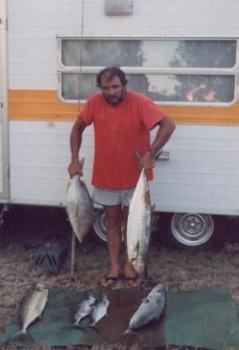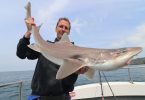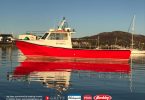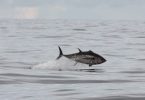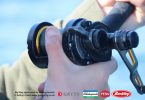Although my first real attempts at catching fish were in the North Sea, I became a freshwater angler when my parents moved to Luton, which is just about as far from the sea as one can get in England. However, my love for sea fishing never left me, and once I had some decent transport, I started driving to the East Coast as well as the Dungeness area for winter cod. I also had a number of trips to the west coast of Ireland where I fished for • and caught • some of the 100lb plus skate that everybody seemed to be chasing in those days. So, when I moved to Australia and found my self living only a few minutes drive from the Indian Ocean, I was far from unhappy, and within a few days of arriving I was exploring a totally new concept in fishing as far as I was concerned.
Unlike the Atlantic, which always seemed to be icy cold to me whenever I got a wader full of it, or "surf fisher’s crotch" as we used to call it when the water went considerably higher than the top of a wader, the Indian Ocean is often quite warm in the summer and not really cold in the winter. So, all of a sudden, fish I had only read about were within comparatively easy reach instead of being ‘half way around the world’ away.
 My first outings were to a groin at Fremantle and also to the local beaches. None of the fish I caught were outstanding, but they were fun to catch and my bags consisted mainly of tailer, bonito, small reef sharks and a stingray known locally as an eagle ray, but what is really a bull ray. All of the fish fought well • especially the bull ray. They are fantastic fighters and it is not unusual to finish up with blistered thumbs when you catch one. However, whenever I spoke to other anglers the name of one place kept on cropping up, and the message that came through was that that place, Exmouth, was the place to visit if you wanted to catch real fish! My interest was definitely aroused and so I began to see what I could find out about the place.
My first outings were to a groin at Fremantle and also to the local beaches. None of the fish I caught were outstanding, but they were fun to catch and my bags consisted mainly of tailer, bonito, small reef sharks and a stingray known locally as an eagle ray, but what is really a bull ray. All of the fish fought well • especially the bull ray. They are fantastic fighters and it is not unusual to finish up with blistered thumbs when you catch one. However, whenever I spoke to other anglers the name of one place kept on cropping up, and the message that came through was that that place, Exmouth, was the place to visit if you wanted to catch real fish! My interest was definitely aroused and so I began to see what I could find out about the place.
When I looked at a map of Western Australia and found Exmouth my heart sank, I really hadn’t appreciated just how big a country I was living in. So many of the people who had told me about it described it as though it was just up the road a bit. Well I guess it is, but that bit is about the distance between Lands End and John o’Groats! The directions were quite easy to follow though, all I had to do was chuck a leftie at the end of my road, turn right thirty miles on, turn left at the end of that road and then continue on that road for about 700 miles before turning left for Exmouth! However, we decided to give it a go, hung the boat on the back of the car and set off.
Much of the country in that part of Australia is semi-arid, and it is hot! Temperatures in the high 40’sC are not unusual, and so before undertaking a trip into such areas you are advised to ensure that you are carrying plenty of water and food. We made sure we had hugely adequate supplies of both, plus a lot more drink of other kinds. But, wouldn’t you know it, we reached the semi-arid area just after one of the rare rain storms, and where there was danger of dying with thirst most of the year, I was driving through flood water. The storm’s effect at Exmouth was disastrous, instead of the crystal clear water I had been promised, the sea was red with the red sand that had been washed into it by the storm. We put the boat into the water, but couldn’t find clear water in the distance I was prepared to go in a boat of that size, so during the first week the fishing was pretty disappointing • as was the snorkelling due to the lack of visibility. The second week was a bit better, though nothing outstanding, but I could see the potential of the place and I was determined to return to exploit it to a much greater degree.
Exmouth is in the tropics and so many of the fish are tropical fish, as one would expect. They live among beautiful coral reefs and many species are in super abundance numbers. If you let your boat drift quietly along the reef, you can see shoals of spangled emperors, coral trout, groupers, barracuda, eagle rays, bat fish and many, many more just quietly going about their business. If you have approached them quietly and not scared them, (reef fish are about as spooky as chub) a mullie • which is like heavily built sprat • cast some distance beyond them, and then slowly worked back to the boat will normally produce a savage take. If you are lucky, it will be one of the spangled emperors that has taken your bait as not only do they give a fantastic fight, but they are one of the best table fish you will ever encounter. However, long toms also like mullies, they are like huge garfish and they have mouths like chainsaws. They give a good fight, but they can be tricky to unhook, and it is frustrating to be catching them when there are good eating fish to be taken. Trevally can also be a bit of a pain in this situation too. They swim in huge shoals and it can be impossible to get a bait through them to the better eating fish below them. Sure they fight well, but they will often kite and just circle the boat making it almost impossible to get them closer with the light gear I use when I am fishing the reef.
Although the water inside of the reef is generally fished for medium sized table fish, fish of much greater proportions do frequent the shallow water too, and I have seen and hooked fish that would set any angler’s heart racing. Unfortunately though, when big fish are hooked in shallow water, the only thing they appear to have in mind is to get back into deep water just as quickly as possible. A stingray six feet across can move unbelievably quickly and can be quite impossible to stop whether you be on the beach or in a small boat. On one occasion I did try using some heavier tackle while fishing from a thirteen-foot boat, and I hooked one of the big rays too! It took off at top speed and was dragging my boat astern so quickly I quickly realised the futility of the exercise and when I eventually lost the fish I had hooked I never bothered to try that stunt again. Instead, I went fishing on the beach at night and used whole garfish as baits, just after high tide I had a good run. The strike connected and before I knew what was happening I was being dragged down the beach and into the water. After losing that fish I recast and exactly the same thing happened, whether the fish responsible were rays or shovelnose sharks I will never know, but they were certainly very big, powerful fish.
The water outside of the reef teems with many oceanic species including the whale shark • the biggest fish in the world today. Exmouth is one of the few places at which you can reasonably expect to see a whale shark at certain times of the year. They are plankton eaters and cruise just below the surface as they feed simply by keeping their mouths open. Thirty-five feet is a fairly normal length for one of them and their weight runs into tons! They are of no interest to anglers, but they are a spectacular sight, and many people go and look for them and then jump into the water so that they can snorkel alongside them. Whales are also seen in the same vicinity, and if you just let your boat drift, they will come quite close to you. It’s a bit scary at first, but you soon realise that they must know exactly where you are, as missing the boat by a matter of inches on numerous occasions cannot just be accidental! Humpbacks are the most common
species, and if the whale shark sounds big, you cannot begin to imagine the size of a humpback whale! I can only describe them as being immense!


There are a lot of sharks that are of interest to anglers though, and they are not a difficult species of fish to attract either. In fact one friend of mine and I used a pike method to get sharks into our vicinity. We fished for spangled emperors, and once we had a shoal of them feeding, it wasn’t long before a shark or two would move in on them. Most of those we caught were grey nurse sharks, bronze whalers, black whalers, hammerheads and the odd tiger shark too. The bronze whalers and the hammerheads were a lot of fun to catch, they are fantastic fighting fish and the bronze whaler is also a good eating fish into the bargain. One thing I particularly liked about the hammerheads was that while they are very fast, they stay well clear of snags and don’t make tremendously long runs. So Paul and I would often fish for them with very light tackle, and I beat a fair number of them to over 100lbs on an Abu Atlantic 443S rod and an Ambassadeur 5001c reel loaded with 15lb line.
 A much greater challenge however is the tiger shark. They grow big and mean, they are a species that grow big enough to be capable of eating a man, and on occasions they are quite happy to do it too. Like the white pointer, they are unpredictable and if I see one when I am snorkelling I immediately get out of the water and move to another area. However, if I see one in the area in which I am fishing, I will put out a proper shark rig in the hope of hooking it. I have only caught two of the sizeable ones I have seen, one was about eight feet in length, but for some reason it was a thin, poorly conditioned fish that virtually came straight to the boat with little resistance. The other one however was in the region of fourteen feet in length and was estimated to exceed 1200lbs. It was a superbly conditioned fish and while it didn’t fight much, (tiger sharks don’t) it made me work very hard for over two and a half hours to get it to the boat. The shade temperature that day was just below 40C, so the temperature in an open boat was well above that! It was only due to the fact that all on board made their drinks available to me that I was able to fight the fish without becoming severely dehydrated. Once I had the fish at the side of the boat we took measurements as accurately as we could, which wasn’t very accurate at all because we were all a bit frightened of the pointed end of it. However, it was pretty close to one third of the length of the 42 foot boat I was on.
A much greater challenge however is the tiger shark. They grow big and mean, they are a species that grow big enough to be capable of eating a man, and on occasions they are quite happy to do it too. Like the white pointer, they are unpredictable and if I see one when I am snorkelling I immediately get out of the water and move to another area. However, if I see one in the area in which I am fishing, I will put out a proper shark rig in the hope of hooking it. I have only caught two of the sizeable ones I have seen, one was about eight feet in length, but for some reason it was a thin, poorly conditioned fish that virtually came straight to the boat with little resistance. The other one however was in the region of fourteen feet in length and was estimated to exceed 1200lbs. It was a superbly conditioned fish and while it didn’t fight much, (tiger sharks don’t) it made me work very hard for over two and a half hours to get it to the boat. The shade temperature that day was just below 40C, so the temperature in an open boat was well above that! It was only due to the fact that all on board made their drinks available to me that I was able to fight the fish without becoming severely dehydrated. Once I had the fish at the side of the boat we took measurements as accurately as we could, which wasn’t very accurate at all because we were all a bit frightened of the pointed end of it. However, it was pretty close to one third of the length of the 42 foot boat I was on.
Most of the time, we have a pretty good idea of what we are going to hook, and what we have hooked while we are fighting the fish, but every now and again the odd fish confuses us. One day, Paul and I were fishing from his dinghy inside of the reef when I hooked an extremely powerful fish. It was taking line at a rate of knots, so Paul fired up the 8hp engine he had on his dinghy, and even when we had the boat flat out, the fish was till taking line! Eventually it snagged me, so Paul put on fins and a facemask and rolled over board to see if he could see what the fish was. Just as it came free of the snag he caught a glimpse of it and told me that I had hooked a huge chinaman cod. It was tiring by this time, and a few minutes later we lifted it into the boat. It later weighed in at 29lbs which was quite close to the record at that time.
A more impressive incident occurred when Lyle and I went out to find a whale shark that we could swim with. As they are easily spooked, it is necessary to keep the boat at low speed so that everything is fairly quiet, and the speed at which we were running was an ideal speed for trolling a lure, so I put one out. The rod was in one of the tubes at the stern of the boat, and I was keeping an eye open for the main objective of the day when the check on my reel suddenly began to scream. I rushed over to the rod hoping that I had hooked a spanish mackerel, picked it up, tightened the drag and set the hook. I knew immediately that it was no mackerel of any kind, and I shouted to Lyle to back up quickly. He threw the motor into reverse and started following the fish. However, it quickly became obvious that the fish was not going to come to the boat easily, so he spun the boat round so that we could follow it while running forward. I was using a 15kg rig and I bent into the fish as much as I could, but it had no effect what so ever, the fish just kept running, quite slowly, towards the western horizon. After half an hour, the fish was still going in the same direction, and I was still applying all the pressure I could. Quite clearly, the fish wasn’t aware that it was hooked! I was wishing that there had been three of us on the boat so that we could have run ahead of the fish and someone could have gone over board with fins and a facemask just so that we would know what it was. It was about 40 feet down and the visibility was much greater than that on that occasion, but with two of us, that just wasn’t possible. Anyway, just as I was wondering what I could do, the swivel broke and the fish was gone. At the time I was furious because I had gone to the expense of buying rated swivels and it was rated well above 15kgs. It should never have broken under the strain I was applying. Later on, however, I realised that it saved me the ignominy of having to cut my line, because we were getting to be a long way from land, and we didn’t want to be out much further. Of course the incident was the talking point for several days, and I eventually came to the conclusion that I had probably foul hooked a manta ray. A fish of a couple of tons would hardly notice the pressure I could apply with a 15kg rig!
One of the nicest things about tropical water is that it is warm! In the Exmouth region the ocean is normally around 28C, so it is no hardship to get into the water. Sometimes we do it to cool off, some times just to watch the fish and other times to go and get a few lobsters for dinner. It was on one of the latter excursions that I saw a fish I never dreamt could exist. Lyle had just dived to the bottom after a lobster and he called to me as he surface to ask me if I could identify a fish that was circling him, so I swam over to him to investigate. When I got to him, I could hardly believe what I saw, it was a trevally far beyond a size I thought they achieved, it didn’t stay around for very long, but I saw enough of it to be convinced that it would have had to have exceeded 70lbs. When I got home and told friends about it, few of them believed me, trevally just don’t grow that big, not those in that part of the world anyway. Thankfully however, some time later a news paper photograph proved that they most certainly do • even though the captor never got all of his fish to the boat!

It is a couple of years since I was last up at Exmouth and there is almost no chance of me getting up there this year, but I will return to the place before too much time has passed. I know that there will be some changes • new conservation laws have put some areas out of bounds to anglers and divers alike. However, the fishing is improving after being ravaged by idiots taking nets and huge freezers with them. The town itself will have changed too, some
of you may have read recently that it was hit by the most powerful cyclone ever to have hit Australia. Almost half of the town was destroyed and they are now in the process of re-building. However, I am convinced that before too much time has passed Exmouth will be renowned around the world for its excellent fishing, especially when someone really gets into the marlin that are present off that part of the coast. Hopefully, one day perhaps, I will be fortunate enough to set a hook into one of them myself.
chevin – 1999

